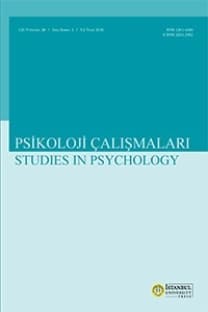4-6 Yaş Çocuklarında Kaynak Dağıtımında Eşitsizlikten Kaçınmayı Etkileyen Faktörlerin İncelenmesi
Kaynak dağıtımı, eşitsizlikten kaçınma, ortak iş yapma
Investigation of Factors Affecting Inequality Aversion In Resource Distribution In 4-6 Year Old Children
Resource distribution, inequality aversion, collaboration,
___
- Adams, J. S. (1965). Inequity in social exchange. L. Berkowitz (Ed.), Advances in experimental social psychology içinde (Cilt 2, s. 267-299). New York: Academic Press.
- Blake, P. R. ve McAuliffe, K. (2011). “I had so much it didn’t seem fair”: Eight-year-olds reject two forms of inequity. Cognition, 120(2), 215-224.
- Blake, P. R., McAuliffe, K. ve Warneken, F. (2014). The developmental origins of fairness: The knowledge–behavior gap. Trends in Cognitive Sciences, 18(11), 559-561.
- Brosnan, S. F. ve De Waal, F. B. (2003). Monkeys reject unequal pay. Nature, 425(6955), 297-299.
- Case, R. (1985). Intellectual development: Birth to adulthood. New York: Academic Press.
- De Ribaupierre, A. ve Bailleux, C. (1994). Developmental change in a spatial task of attentional capacity: An essay toward an integration of two working memory models. International Journal of Behavioral Development, 17(1), 5-35.
- Dunn, L. M. (1965). Expanded manual for the Peabody Picture Vocabulary Test. American Guidance Service.
- Fehr, E., Bernhard, H. ve Rockenbach, B. (2008). Egalitarianism in young children. Nature, 454(7208), 1079-1083.
- Fehr, E. ve Schmidt, K. M. (1999). A theory of fairness, competition, and cooperation. The Quarterly Journal of Economics, 114(3), 817-868.
- Festinger, L. (1954). A theory of social comparison processes. Human Relations, 7(2) 117-140.
- Hamann, K., Warneken, F., Greenberg, J. R. ve Tomasello, M. (2011). Collaboration encourages equal sharing in children but not in chimpanzees. Nature, 476(7360), 328-331.
- Hedtvedt, K. A. (2006). Justice frameworks. P. Burke (Ed.), Contemporary social psychological theories içinde (Cilt 1, s. 46-69). Stanford, CA: Stanford University Press.
- Kanngiesser, P. ve Warneken, F. (2012). Young children consider merit when sharing resources with others. PlosOne,7(8), 1-5.
- Katz, J., Demir, N., Önen, F., Uzlukaya, A. ve Uludağ, A. (1972). Türkçe konuşan çocuklar için Peabody Resim Kelime Testi Resim Dizisi (Peabody Picture-Vocabulary Test). Ankara: Ankara Rehberlik ve Araştırma Merkezi.
- LoBue, V., Nishida, T., Chiong, C., DeLoache, J. S. ve Haidt, J. (2011). When getting something good is bad: Even three‐year‐olds react to inequality. Social Development, 20(1), 154-170.
- Loewenstein, G. F., Thompson, L. ve Bazerman, M. H. (1989). Social utility and decision making in interpersonal contexts. Journal of Personality and Social Psychology, 57(3), 426.
- McAuliffe, K., Blake, P. R., Kim, G., Wrangham, R. W. ve Warneken, F. (2013). Social influences on inequity aversion in children. PloSone, 8(12), 1-11.
- Melis, A. P., Hare, B. ve Tomasello, M. (2006). Engineering cooperation in chimpanzees: Tolerance constraints on cooperation. Animal Behaviour, 72(2), 275-286.
- Moore, C. (2009). Fairness in children’s resource allocation depends on the recipient. Psychological Science, 20(8), 944-948.
- Öner, N. (2006). Türkiye’de kullanılan psikolojik testlerden örnekler. İstanbul: Boğaziçi Üniversitesi Yayınları.
- Paulus, M. (2015). Children’s inequity aversion depends on culture: A cross-cultural comparison. Journal of Experimental Child Psychology, 132, 240-246.
- Piaget, J. (2002). Judgement and reasoning in the child (M. Warden, Çev). Londra: Routledge.
- Savaşır, I., Sezgin, N. ve Erol, N. (1992). 0–6 yaş Çocukları için Gelişim Tarama Envanteri geliştirilmesi: Ön çalışmalar. Türk Psikiyatri Dergisi, 3(2), 33-42.
- Savaşır, I., Sezgin, N. ve Erol, N. (2006). Ankara Gelişim Tarama Envanteri el kitabı (Düzeltilmiş 4. Baskı) Ankara: Türk Psikologlar Derneği.
- Schafer, M., Haun, D. B., ve Tomasello, M. (2015). Fair is not fair everywhere. Psychological Science, 26(8), 1252-1260.
- Sheskin, M., Bloom, P. ve Wynn, K. (2014). Anti-equality: Social comparison in young children. Cognition, 130(2), 152-156.
- Silk, J. B., Brosnan, S. F., Vonk, J., Henrich, J., Povinelli, D. J., Richardson, A. S., ... ve Schapiro, S. J. (2005). Chimpanzees are indifferent to the welfare of unrelated group members. Nature, 437(7063), 1357-1359.
- Steinbeis, N. ve Singer, T. (2013). The effects of social comparison on social emotions and behavior during childhood: The ontogeny of envy and Schadenfreude predicts developmental changes in equity-related decisions. Journal of Experimental Child Psychology, 115(1), 198-209.
- Thompson, C., Barresi, J. ve Moore, C. (1997). The development of future-oriented prudence and altruism in preschoolers. Cognitive Development, 12(2), 199-212.
- Tomasello, M., Melis, A. P., Tennie, C., Wyman, E.,ve Herrmann, E. (2012). Two key steps in the evolution of human cooperation: The interdependence hypothesis. Current Anthropology, 53(6), 673-692.
- Tomasello, M. ve Vaish, A. (2013). Origins of human cooperation and morality. Annual Review of Psychology, 64, 231-255.
- Warneken, F., Lohse, K., Melis, A. P. ve Tomasello, M. (2011). Young children share the spoils after collaboration. Psychological Science, 22(2), 267-273.
- Williams, A. ve Moore, C. (2014). Exploring disadvantageous inequality aversion in children: How cost and discrepancy influence decision-making. Frontiers in Psychology, 5, 1-6.
- ISSN: 1304-4680
- Başlangıç: 1956
- Yayıncı: İstanbul Üniversitesi
Genç ve Orta Yaşlı Yetişkinlerin En Eski ve Daha Sonraki Otobiyografik Anılarının Karşılaştırılması
Berivan ECE, Burcu DEMİRAY, Sezin ÖNER, Sami GÜLGÖZ
Büyük Veri ve Derlem Anlambilim Açısından Aşk Kavramı: Anlam, Gönderim ve Metafor
Romantik İlişki Becerileri Psikoeğitim Programının Etkinliğinin Sınanması: Bir Pilot Çalışma
Ahmet TOGAY, İrem ŞAHİN, Meral ATICI
4-6 Yaş Çocuklarında Kaynak Dağıtımında Eşitsizlikten Kaçınmayı Etkileyen Faktörlerin İncelenmesi
“Kendini Unutmak”: Psikoloji Araştırmalarında Tevazu
Emine YÜCEL, Gökhan ARSLANTÜRK
Sosyal Psikolojinin Altın Çağını Yeniden Düşünmek
Onurcan YILMAZ, Hasan G. BAHÇEKAPILI
Sahte Hatıralarda Zorunlu Seçim Yöntemi ile Hatırlıyorum/ Biliyorum ve Modalite Etkileri
Gökhan ŞAHİN, Hasan Gürkan TEKMAN
Tek Yumurta İkizi Ergenlerde İkiz Bağı ve Ayrışma-Bütünleşme Süreci
